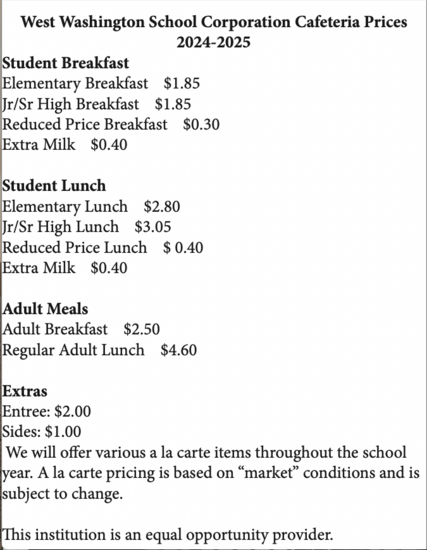Prepping your child with basic skills before entering Kindergarten will most likely help ensure the child graduates high school and experiences financial independence later in life.
Align Southern Indiana has created a checklist of skills that should be acquired before the first day of Kindergarten:
Successful School Skills:
Communicates needs and thoughts
Follows rules and routines
Follows directions (sits quietly, knows the meaning of “no”)
Appropriately talks and communicates with others
Controls feelings and behaviors (emotions)
Holds pencil correctly
Math:
Recognizes numbers 0 to 9
Can touch and count up to 9 objects
Can count 0 to 9
Recognizes basic shapes: circle, triangle, rectangle, square
Self Help Skills:
Can dress and undress self independently
Is toilet trained
Zipping and buttoning
Appropriate use of toilet paper
Washes hands
Flushes
Literacy:
Book reading
Left to right, top to bottom
Understands how to hold a book correctly and turn the pages
Recognition of letters by name (a-b-c)
Knows how to respond using at least three words
Recognizes their name
Can write their first name
Listens to a complete story

The State of Indiana requires that all public school students receive specific immunizations before starting school. The type of immunizations vary depending on the age of the child.
Below is a list of required immunizations, based on grade level, as well as recommended immunizations that should be considered:
Pre-Kindergarten
Required:
3 Hepatitis B
4 DTaP (Diphtheria, Tetnus and Pertussis
3 Polio
1 Varicella (Chickenpox)
1 MMR (Measles, Mumps and Rubella)
2 Hepatitis A
Recommended:
Annual Influenza
COVID vaccine
Haemophilus influenza type B
Pneumococcal conjugate
K-5th Grade
Required:
3 Hepatitis B
5 DTaP
4 Polio
2 Varicella
2 MMR
2 Hepatitis A
Recommended:
Annual influenza
COVID
6th-11th Grade
Required:
2 Hepatitis B
5 DTaP
4 Polio
2 Varicella
2 MMR
2 Hepatitis A
1MCV4 (Meningococcal)
1Tdap (Tetanus, Diphtheria and Pertussis
Recommended:
Annual influenza
2/3 HPV (Human papillomarviris)
COVID
12th Grade
Required:
3 Hepatitis B
5DTaP
4 Polio
2 Varicella
2 MMR
2 Hepatitis A
2 MCV4
1Tdap
Recommended:
Annual influenza
2/3 HPV
2 MenB (Meningococcal)
COVID
Additional Information:
HepB: The minimum age for the 3rd dose of
Hepatitis B is 24 weeks of age.
DTaP: 4 doses of DTaP/DTP/DT are acceptable if
4th dose was administered on or after child’s 4th
birthday.
Polio*: 3 doses of Polio are acceptable for all
grade levels if the 3rd dose was given on or after
the 4th birthday and at least 6 months after the
previous dose.
*For students in grades K-12, the final dose must
be administered on or after the 4th birthday and
be administered at least 6 months after the
previous dose.
Varicella: Physician documentation of disease
history, including month and year, is proof of
immunity for children entering preschool through
12th grade. Parent report of disease history is not
acceptable.
Tdap: There is no minimum interval from the last
Td dose.
MCV4: Individuals who receive dose 1 on or after
the 16th birthday only need 1 dose of MCV4.
Hepatitis A: The minimum interval between 1 st
and 2nd dose is 6 calendar months. 2 doses are
required for all grades Pre-K through 12.
COVID-19: COVID-19 vaccine is recommended
for all students five years of age and older per
CDC and FDA’s Emergency Use Authorization.

Being able to offer free breakfast and lunch to every student at Salem Community Schools is important to SCS Food Director Karen Libka. When she recently got word thatit was going to happen next school year, she was thrilled!
This past school year, breakfast and lunch was free at Bradie Shrum Elementary and Salem Middle School.
“In the past, the high school didn't qualify for the CEP program because their direct certification percentage wasn't high enough,” she said. “This percentage is based on students who have at least one person in their household that receives benefits from SNAP, TANF or Medicaid Free.”
She said there are other qualifications, too, such as a homeless student, foster student, or migrant worker.
“To qualify to participate in the CEP program, at least 40% of your students had to be directly certified,” she said. “So students that fill out an application and qualify for free meals that way don't count in this percentage. And no student that qualifies for reduced meals, either through direct certification or an application count in the percentage necessary, do either.”
Libka said congress did change this requirement about a year ago to 25% and said some states are providing funding by making up the difference. In other places funding is coming from large organizations that have money and want to support the local schools making sure every child can eat for free.
“Otherwise schools have to make up the difference and this money has to come from the school corporation budget,” she said. “It cannot come from the USDA school nutrition fund. Again, most schools cannot afford that.”
Libka explained that the high school still has a low direct cert percentage and is currently only a little over 41% and if it was the only school that qualified SCS couldn't afford to do it.
“But the direct cert percentage continues to rise a little at BSE and the SMS percentage jumped up about 3% this year,” she said. “This helps offset the numbers at the high school. None of the schools are fully funded, but we watch our spending, we have great procurement and are always looking for ways to save and a committed staff working hard to make this happen for our students. So we decided to give it a try at the high school this next year.”
Libka said offering the free meals is important to her because it is difficult for hungry students to learn, grow and mature.
“Study after study shows that students that start with school breakfast in the morning have higher test scores, less behavior problems, lower absenteeism and overall better health,” she said. “School lunch helps get them through the rest of the day. When we had free meals during Covid because of the national waiver, I saw first hand what a difference providing free meals made for our students. And it was one less stress for their families as well. For so many of our students school meals are the most nutritious meals our students receive and for some, the only meals they receive.”
Libka said that on average, the cafeteria serves between 575-600 breakfasts a day at all three schools.
With the new school year, she said they are looking forward to going back to free meals for all students like it was during Covid.
“This is a big cost savings for our families and less worry about needing lunch money for both the parents/guardians and the student,” she said.
When discussing menus for the upcoming year, Libka said they are always looking at new things for the school menus.
“We go to food shows, talk to other schools in our co-op (the school nutrition program belongs to a cooperative with several other schools to do some procurement together, share ideas, problem solve, share recipes, etc,), we look at trade magazines and articles, belong to the both the State and National School Nutrition Association, attend conferences and workshops, etc. looking for new ideas,” she said. “In addition we talk to students themselves and ask what they like, don't like, what they want. If we can afford it and can make it fit into the USDA guidelines, we try to make it happen.”
Libka said the school nutrition staff is required to have a certain amount of professional development training hours each year depending on their position. She said the staff has made a tremendous effort in going above and beyond in completing professional development this year.
“Most of the staff have tripled the amount of hours that is required and several staff members have gone beyond that,” she said. “We have several staff members attending workshops and conferences this summer as well. The school nutrition staff is working hard to learn and grow and be the best they can be. Honestly, I am so proud of them!”
SalemLeader.com
Leader Publishing Company of Salem, Inc.
P.O. Box 506
117-119 East Walnut Street
Salem, Indiana. 47167
Phone: 812-883-3281 | Fax: 812-883-4446
Business Hours:
Mondays through Fridays, 9:00am - 5:00pm
News:
news@salemleader.com
Office:
office@salemleader.com
Publisher:
publisher@salemleader.com
Business
- More Business News
- Go To Guide
- Business Directory
- Auctions
Education
- More Education News
Opinion
- Editorials
- Letters to the Editor
- Columns
- Unsung Heroes
- Days Gone By
- In the Garden
- Guest Columns
- Reader's Poll
- Salem Leader Forum
- Questions and Answers
Church
- Bible Aerobics
- Church News
- Church Directory



